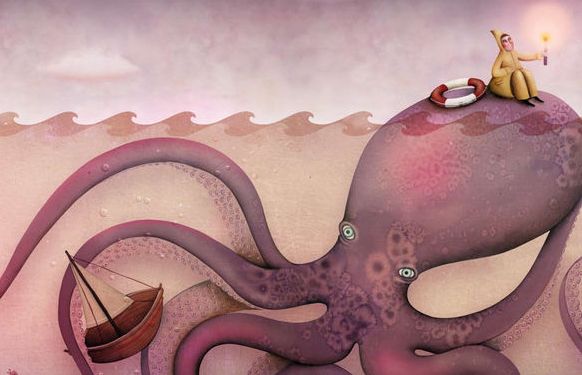Today I’ll Go Find All the Good That Life Has Ready for Me

I have decided that I can, I must, and that I deserve it. Today, I will put on my new shoes and my renewed energy to let life mess up my hair laughing, dancing, hugging. Because all the good messes up our hair and unsettles our soul and I think it is time to put my shoes on again with that almost forgotten sensation.
We all go through those periods when suddenly we tell ourselves “that’s enough.” Mental exhaustion or pressure from our surroundings are tearing away, one by one, at each scale on those mermaid tails that we had enjoyed before to swim freely through our personal oceans. However, saying “that’s enough” is not always enough to create the change we desire.
“We have been created for greater things, to love and be loved.”
-Teresa de Calcuta-
Phrases like “I deserve the best,” “it is time to put myself first,” or “I have the right to be happy” are like those proverbs that we tell ourselves time and time again but that do not end up having any effect at all. Despite thinking that returning to the corner, life may have something good saved up for us, it is not at all easy to take a step towards the extraordinary, especially if our mind is determined to stick to the usual, to the foreseeable.
Change towards the sublime does not require a planned appointment. We do not have to ask for turns or wait for a shooting star to ask for our wish. A happier life only requires one thing: a happier brain.

The exhausted brain and the closed windows
Have you ever stopped to think about how many thoughts we have throughout the day? Neurologists love these kinds of questions, so it didn’t take them long to give us a response: around 50,000. However, it is worth mentioning that almost 80% of these have absolutely no use. Most of them are repetitive, mechanical, or even obsessive.
The exhausted brain is the echo of an unhappy mind. This train of debilitating thought travels along the tracks of the “if I had…” “if others let me…” or “I am incapable of…” Sometimes, in those extremely infertile and inhospitable ruts, the mind blames those who are around us for each and every one of our unhappy moments. In this way, we continue to feed the motor of our tired brain, that scattered brain that is incapable of resolving the issue.
So then, closing the window of our mind in this way will make us listen to only the echo of a fantastic whisper: that brought by fear, indecision, despair. A good idea to get in touch with the good things that offers us has to do with an open attitude, which allows two fabulous processes to be integrated into our mind: recycling and creation.

We are sure that you recycle in an attempt to care for the environment and the planet. Our mind also needs similar “upkeep.” A good number of our thoughts have no purpose at all; they are harmful, so instead of accumulating them, we have to start recycling them. For this, nothing is better than transforming an “I can’t” into an “I deserve the chance to try it.”
In addition to recycling, we will have a healthier mind if we perfect ourselves at creating and dealing with our thoughts. The ideas, goals, and new attitudes create, reinforce, or weaken connections between the neurons in our brains. With new thoughts come new and powerful emotions to say goodbye to that exhausted mind with closed windows.
The good in life: the ability to take on new perspectives
To understand the magic of our brain and our emotions, we invite you to do a little experiment. Take a photo or a printout of a beautiful landscape. Now, put your nose right up against the image. As you try to focus your attention on what you see, the only thing you will manage to distinguish is a crowded blur that does not bring anything to mind.
Our tired mind works in the same way. It is not at all enriching to contemplate things form this perspective. However, if we move away from it, little by little, a world will start opening up, full of possibilities and inspiring beauty. Putting distance between yourself and many of the things around us is something positive. It offers the chance to become aware that nothing, absolutely nothing, has enough power over us to make us its slave.

Keys for being receptive to the good that life can bring us
The University of California conducted an interesting study on happiness from the perspective of neurology, which turns out to be just as practical as it is enlightening. The study led to a book entitled “Train Your Brain to Get Happy.” In this book, it is explained to us how our thoughts create changes in “our gray cells” to create a powerful emotional material where balance and well being breathe.
To be more permeable to opportunities of our contexts, it is not enough to simply say, “I am going to go find my happiness.” Before installing new thoughts, we have to get rid of the old ones.
Sometimes, asking ourselves questions forces us to focus our attention on those queries and to turn our resources towards solving them. A good question is like a vacuum cleaner capable of picking up what is not helpful, what does harm. For example, instead of telling ourselves “I want to be happy,” it is better to ask ourselves “what is stopping me from being happy?” Once we ask this question, it is time to reflect.
On the other hand, there are aspects that we have to have clear in our minds. The person who wants to be happier does not compare himself with others. They also do not feed their language with conditional tenses (“if I had this,” “if I were like,” “if others noticed that”).
Speak in the present tense, be firm in your goals, and do not measure your abilities based on others. Cultivate inspiring, invigorating, and creative thoughts. Remember above all else that only open minds see the extraordinary things where others only see ordinary things.
Images courtesy of Marie Desbons and Milla Marquis
I have decided that I can, I must, and that I deserve it. Today, I will put on my new shoes and my renewed energy to let life mess up my hair laughing, dancing, hugging. Because all the good messes up our hair and unsettles our soul and I think it is time to put my shoes on again with that almost forgotten sensation.
We all go through those periods when suddenly we tell ourselves “that’s enough.” Mental exhaustion or pressure from our surroundings are tearing away, one by one, at each scale on those mermaid tails that we had enjoyed before to swim freely through our personal oceans. However, saying “that’s enough” is not always enough to create the change we desire.
“We have been created for greater things, to love and be loved.”
-Teresa de Calcuta-
Phrases like “I deserve the best,” “it is time to put myself first,” or “I have the right to be happy” are like those proverbs that we tell ourselves time and time again but that do not end up having any effect at all. Despite thinking that returning to the corner, life may have something good saved up for us, it is not at all easy to take a step towards the extraordinary, especially if our mind is determined to stick to the usual, to the foreseeable.
Change towards the sublime does not require a planned appointment. We do not have to ask for turns or wait for a shooting star to ask for our wish. A happier life only requires one thing: a happier brain.

The exhausted brain and the closed windows
Have you ever stopped to think about how many thoughts we have throughout the day? Neurologists love these kinds of questions, so it didn’t take them long to give us a response: around 50,000. However, it is worth mentioning that almost 80% of these have absolutely no use. Most of them are repetitive, mechanical, or even obsessive.
The exhausted brain is the echo of an unhappy mind. This train of debilitating thought travels along the tracks of the “if I had…” “if others let me…” or “I am incapable of…” Sometimes, in those extremely infertile and inhospitable ruts, the mind blames those who are around us for each and every one of our unhappy moments. In this way, we continue to feed the motor of our tired brain, that scattered brain that is incapable of resolving the issue.
So then, closing the window of our mind in this way will make us listen to only the echo of a fantastic whisper: that brought by fear, indecision, despair. A good idea to get in touch with the good things that offers us has to do with an open attitude, which allows two fabulous processes to be integrated into our mind: recycling and creation.

We are sure that you recycle in an attempt to care for the environment and the planet. Our mind also needs similar “upkeep.” A good number of our thoughts have no purpose at all; they are harmful, so instead of accumulating them, we have to start recycling them. For this, nothing is better than transforming an “I can’t” into an “I deserve the chance to try it.”
In addition to recycling, we will have a healthier mind if we perfect ourselves at creating and dealing with our thoughts. The ideas, goals, and new attitudes create, reinforce, or weaken connections between the neurons in our brains. With new thoughts come new and powerful emotions to say goodbye to that exhausted mind with closed windows.
The good in life: the ability to take on new perspectives
To understand the magic of our brain and our emotions, we invite you to do a little experiment. Take a photo or a printout of a beautiful landscape. Now, put your nose right up against the image. As you try to focus your attention on what you see, the only thing you will manage to distinguish is a crowded blur that does not bring anything to mind.
Our tired mind works in the same way. It is not at all enriching to contemplate things form this perspective. However, if we move away from it, little by little, a world will start opening up, full of possibilities and inspiring beauty. Putting distance between yourself and many of the things around us is something positive. It offers the chance to become aware that nothing, absolutely nothing, has enough power over us to make us its slave.

Keys for being receptive to the good that life can bring us
The University of California conducted an interesting study on happiness from the perspective of neurology, which turns out to be just as practical as it is enlightening. The study led to a book entitled “Train Your Brain to Get Happy.” In this book, it is explained to us how our thoughts create changes in “our gray cells” to create a powerful emotional material where balance and well being breathe.
To be more permeable to opportunities of our contexts, it is not enough to simply say, “I am going to go find my happiness.” Before installing new thoughts, we have to get rid of the old ones.
Sometimes, asking ourselves questions forces us to focus our attention on those queries and to turn our resources towards solving them. A good question is like a vacuum cleaner capable of picking up what is not helpful, what does harm. For example, instead of telling ourselves “I want to be happy,” it is better to ask ourselves “what is stopping me from being happy?” Once we ask this question, it is time to reflect.
On the other hand, there are aspects that we have to have clear in our minds. The person who wants to be happier does not compare himself with others. They also do not feed their language with conditional tenses (“if I had this,” “if I were like,” “if others noticed that”).
Speak in the present tense, be firm in your goals, and do not measure your abilities based on others. Cultivate inspiring, invigorating, and creative thoughts. Remember above all else that only open minds see the extraordinary things where others only see ordinary things.
Images courtesy of Marie Desbons and Milla Marquis
This text is provided for informational purposes only and does not replace consultation with a professional. If in doubt, consult your specialist.







